The Australian Military Court replaces the system of individually convened trials by Court Martial or Defence Force Magistrate. The court will be a ‘service tribunal’ under the Defence Force Discipline Act 1982. It is an important part of the military justice system, which contributes to the maintenance of military discipline within the Australian Defence Force.
Establishing the court is one of many reforms to the military justice system. The enhancements ensure a modern and effective approach to military justice, while striking an appropriate balance between effective discipline to allow Australian Defence Force personnel to operate safely and effectively, and protecting individuals and their rights.
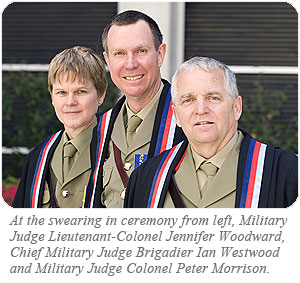 Brigadier Ian Westwood AM was sworn in as the first Chief Military Judge at a ceremony in Canberra on October 3. He has 24 years of military law experience gained through full-time Army service. He was admitted to the Supreme Court of New South Wales in 1978 and appointed to the Australian Army Legal Corps in 1983. Brigadier Westwood, who resides in Canberra, is responsible for ensuring the orderly and expeditious discharge of the business of the Australian Military Court and managing its administrative affairs. He will also sit as a military judge on the court and report to Parliament annually through the Minister for Defence.
Brigadier Ian Westwood AM was sworn in as the first Chief Military Judge at a ceremony in Canberra on October 3. He has 24 years of military law experience gained through full-time Army service. He was admitted to the Supreme Court of New South Wales in 1978 and appointed to the Australian Army Legal Corps in 1983. Brigadier Westwood, who resides in Canberra, is responsible for ensuring the orderly and expeditious discharge of the business of the Australian Military Court and managing its administrative affairs. He will also sit as a military judge on the court and report to Parliament annually through the Minister for Defence.
Two permanent military judges, Colonel Peter Morrison and Lieutenant Colonel Jennifer Woodward were also sworn in. Colonel Morrison, hailing from Townsville, has a combination of private and military legal experience spanning more than 26 years. He was a Judge Advocate and Defence Force Magistrate prior to his appointment.
Lieutenant Colonel Woodward was previously a senior prosecutor for the Australian Capital Territory and a commercial litigation practitioner. Prior to becoming a military judge, she was Director of Advisings, General Counsel Branch, Department of Defence. Lieutenant Colonel Woodward also spent seven years as a permanent legal officer in the Army.
At the swearing in ceremony, Chief of the Defence Force Air Chief Marshal Angus Houston said Defence was strongly demonstrating its commitment to improving the military justice system and delivering impartial and fair outcomes through enhanced oversight, greater transparency and improved impartiality.
“Since the beginning of my tenure as Chief of the Defence Force, I have been absolutely delighted with the progress we have made to our military justice system,” he said.
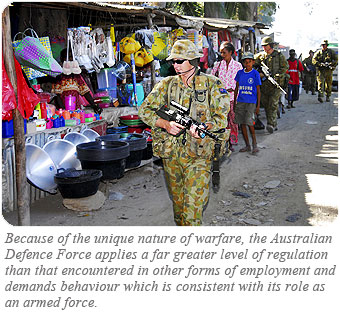 “It is critical to the Australian Defence Force’s operational effectiveness and the protection of individuals and their rights that we have a strong military justice system — one that not only underpins our discipline and command structures but also enables our personnel to work in a fair and just environment.”
“It is critical to the Australian Defence Force’s operational effectiveness and the protection of individuals and their rights that we have a strong military justice system — one that not only underpins our discipline and command structures but also enables our personnel to work in a fair and just environment.”
The new court is judicially independent from the military chain of command and Executive and, although based in Canberra, is fully deployable and able to conduct trials within Australia and overseas, including operational areas.
The Australian Military Court has the same jurisdiction as Courts Martial and Defence Force Magistrates did previously. It only exercises jurisdiction under the Defence Force Discipline Act 1982 where proceedings can reasonably be regarded as substantially serving the purposes of maintaining or enforcing discipline. The Australian Military Court meets the disciplinary needs of the Australian Defence Force in maintaining and enforcing Service discipline by trying more serious or complex Service offences.
How does it work?
As well as the Chief Military Judge and two permanent Military Judges sworn in recently, there will be a panel of part-time (Reserve) military judges. Military Judges are independent from the military chains of command and Executive in the performance of their judicial functions. They may sit alone or with a military jury. Military jurors perform a role akin to jury members in a civilian court system and determine on the evidence whether an accused person is guilty or not guilty of the Service offence.
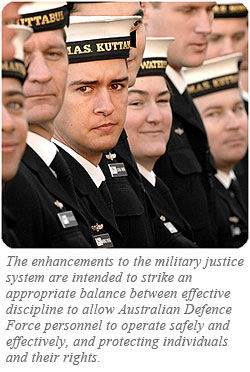 Essentially, the trial procedures of the Australian Military Court are similar to those of civil courts exercising criminal jurisdiction. The general principles and laws of criminal responsibility as provided for within the Criminal Code (Commonwealth) apply in respect of Service offences prosecuted before the Australian Military Court, as do formal rules of evidence. The presumption of innocence to the accused applies as it does in a civil court which means that the prosecution is obliged to prove the case against an accused beyond reasonable doubt.
Essentially, the trial procedures of the Australian Military Court are similar to those of civil courts exercising criminal jurisdiction. The general principles and laws of criminal responsibility as provided for within the Criminal Code (Commonwealth) apply in respect of Service offences prosecuted before the Australian Military Court, as do formal rules of evidence. The presumption of innocence to the accused applies as it does in a civil court which means that the prosecution is obliged to prove the case against an accused beyond reasonable doubt.
All prosecutions before the court are conducted through the office of the statutorily independent Director of Military Prosecutions, Brigadier Lynette McDade. This area consists of several full-time and Reserve prosecutors. The Directorate of Defence Counsel Services, led by Group Captain Chris Hanna, arranges legal representation for the accused. The directorate administers the Defence Counsel Services Panel, which contains more than 150 lawyers from Army, Navy and Air Force who are located across Australia. These lawyers are admitted to practise in a State or Territory of Australia and come from various branches of the legal profession.
Colonel Geoff Cameron, who is the statutorily independent Registrar of the Australian Military Court, assists the Chief Military Judge with the administration of the court and discharges statutory functions.
Other changes to the military justice system include introducing rights of appeal from decisions of the Australian Military Court to the Defence Force Discipline Appeals Tribunal (presided over by tribunal members who may be Federal Court, State or Territory Justices or Judges). In the case of the accused it is available on both conviction and punishment or court order. In the case of the Director of Military Prosecutions it is available for punishment or order only. Following the next tranche of legislative changes, an accused will also have the right to elect trial by the Australian Military Court for certain categories of disciplinary offences.
If an accused is found guilty, punishment as provided for by the Defence Force Discipline Act 1982 is imposed by the presiding military judge taking into account mitigation evidence, the sentencing principles applied by civil courts and the need to maintain discipline in the Australian Defence Force.
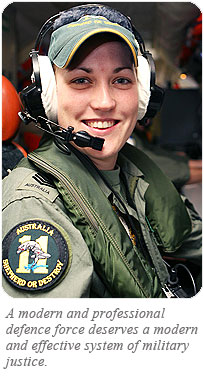 Enhancing impartiality and fairness
Enhancing impartiality and fairness
The selection of the Chief Military Judge and Military Judges was through an independent merit process. They were selected from current qualified Permanent and Reserve Australian Defence Force legal officers and any other person who satisfied the statutory selection criteria.
Key features of the Australian Military Court include:
- statutory appointment of legally qualified military judges,
- security of tenure (10 year fixed terms),
- remuneration set by the Commonwealth Remuneration Tribunal,
- mid-point promotion during tenure,
- the necessary para-legal support to be self administering,
- judges to sit alone or with a jury in the case of more serious offences (military judge presiding), and
- appeals on conviction or punishment to the Defence Force Discipline Appeals Tribunal.
The Australian Military Court proceedings are open to the public except where the Military Judge orders otherwise (for example, if it is contrary to the interests of security or defence of Australia, the proper administration of justice or public morals).
Further enhancements to the military justice system
The Australian Military Court is one of a range of enhancements to the military justice system being introduced by Defence. With the two-year implementation schedule due to finish at the end of this year, Defence is well advanced in putting in place the most significant changes its military justice system has seen in more than 20 years. Twenty-three of the 30 agreed recommendations from the 2005 Senate Report ‘The effectiveness of Australia’s Military Justice System’ are now complete.
Major achievements to date include:
- A new joint Australian Defence Force investigative unit now investigates serious incidents with a service connection.
- There is no longer a backlog of complaints and redresses of grievance due to the additional resources being provided and the hard work of Defence personnel.
- A civilian with judicial experience now presides over Chief of the Defence Force (CDF) Commissions of Inquiries into deaths of ADF members in service or other matters as determined by the CDF.
- The Learning Culture Inquiry Report into ADF Schools and Training Establishments was released in December 2006. It followed the military justice inquiry, which found that some aspects of ADF culture may be related to deficiencies in the military justice system. Action to reinforce ADF culture consistent with core values has reduced the risks of inappropriate behaviour, improved the care and welfare of trainees, and improved the management of minors in particular. More than half of the agreed recommendations are now underway.
For further information about the range of enhancements to the Military Justice System visit, www.defence.gov.au/mjs
Cristy Symington


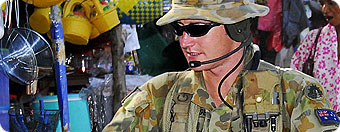
 Brigadier Ian Westwood AM was sworn in as the first Chief Military Judge at a ceremony in Canberra on October 3. He has 24 years of military law experience gained through full-time Army service. He was admitted to the Supreme Court of New South Wales in 1978 and appointed to the Australian Army Legal Corps in 1983. Brigadier Westwood, who resides in Canberra, is responsible for ensuring the orderly and expeditious discharge of the business of the Australian Military Court and managing its administrative affairs. He will also sit as a military judge on the court and report to Parliament annually through the Minister for Defence.
Brigadier Ian Westwood AM was sworn in as the first Chief Military Judge at a ceremony in Canberra on October 3. He has 24 years of military law experience gained through full-time Army service. He was admitted to the Supreme Court of New South Wales in 1978 and appointed to the Australian Army Legal Corps in 1983. Brigadier Westwood, who resides in Canberra, is responsible for ensuring the orderly and expeditious discharge of the business of the Australian Military Court and managing its administrative affairs. He will also sit as a military judge on the court and report to Parliament annually through the Minister for Defence. “It is critical to the Australian Defence Force’s operational effectiveness and the protection of individuals and their rights that we have a strong military justice system — one that not only underpins our discipline and command structures but also enables our personnel to work in a fair and just environment.”
“It is critical to the Australian Defence Force’s operational effectiveness and the protection of individuals and their rights that we have a strong military justice system — one that not only underpins our discipline and command structures but also enables our personnel to work in a fair and just environment.” Essentially, the trial procedures of the Australian Military Court are similar to those of civil courts exercising criminal jurisdiction. The general principles and laws of criminal responsibility as provided for within the Criminal Code (Commonwealth) apply in respect of Service offences prosecuted before the Australian Military Court, as do formal rules of evidence. The presumption of innocence to the accused applies as it does in a civil court which means that the prosecution is obliged to prove the case against an accused beyond reasonable doubt.
Essentially, the trial procedures of the Australian Military Court are similar to those of civil courts exercising criminal jurisdiction. The general principles and laws of criminal responsibility as provided for within the Criminal Code (Commonwealth) apply in respect of Service offences prosecuted before the Australian Military Court, as do formal rules of evidence. The presumption of innocence to the accused applies as it does in a civil court which means that the prosecution is obliged to prove the case against an accused beyond reasonable doubt.  Enhancing impartiality and fairness
Enhancing impartiality and fairness